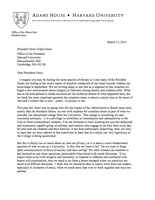
Over the last few decades, current and former administrators say, the resident dean position has evolved from a role that equally balanced academic and administrative work to one that entails a sometimes overwhelming list of bureaucratic duties.
After painstakingly handling the proceedings of the most high-profile academic integrity investigations in Harvard’s history, the College’s resident deans found themselves at the center of another public scandal this spring. But this time, they, and not their students, were the objects of scrutiny.
Revelations that administrators had conducted two sets of secret searches of resident deans’ email accounts to try to identify the source of a leak of information on the cheating case garnered international media attention, casting the deans into the public spotlight.
For some, the searches represented not just an invasion of privacy, but also the idea that resident deans are treated as second-rate administrators who are not afforded the same respect as faculty.
“It has been particularly dispiriting, then, not only to learn that we were subject to this search but to learn that as a result, our very legitimacy at the College is being questioned,” Senior Resident Dean Sharon L. Howell wrote in an open letter to University President Drew G. Faust in March.
The resident deans hold a dual role within the framework of the College, interacting with students both as academic instructors and as House-level advisers. Current and former administrators say that over the past several decades the position has evolved from a role that drew an equal balance between scholarly and administrative work into a job that entails a sometimes overwhelming list of bureaucratic duties.
When Howell penned her letter to Faust, she articulated frustration about an unresolved question that has lingered for decades in the corridors of the Houses—where do resident deans fit in the increasingly complex maze of the administration of Harvard College?
COLLEGIAL COMPANIONS
House deans first moved into the Houses in 1952, on the recommendation of then-Dean of the College Wilbur J. Bender ’27. He envisioned the deanship, soon christened the “Allston Burr Senior Tutor” in honor of a wealthy benefactor to the University, as a half-time advising job for senior faculty that would give students more immediate access to academic guidance.
Dean of Freshmen Thomas A. Dingman ’67, who served as senior tutor in Leverett House from 1978 to 1987 and of Dudley House from 1992 to 2005, recalled that the primary capacity of the role during his early days at Harvard was to guide students’ intellectual trajectory.
“I think the hope was you would attract tutors, who would come in and share their work with students, and serve as important mentors,” Dingman said.
As respected academics, the senior tutors maintained close personal relationships with both students and top administrators, according to folklore and mythology head tutor Deborah D. Foster, who served as senior tutor in Currier from 1989 to 1995.
“My relationship with the House Masters and the Dean of the College was completely and utterly collegial,” she said, recalling that senior tutors regularly called then-Dean of the College L. Fred Jewett ’57 to ask for advice.
BUREACRATIC BURDEN
Today, several current and former administrators said, resident deans occupy a noticeably different position, defined by an increased administrative workload. For resident deans, that means more paperwork, more correspondence, more meetings, and more responsibilities on top of their existing scholarly commitments.
Some former House officials say this change can be partly attributed to the increased centralization of the College administration. In the 1990s, they say, administrators made a conscious effort to absorb resident deans into an increasingly hierarchical College.
Read more in News
Late Night in the SquareRecommended Articles
-
Senior Resident Dean Critiques Administrators' ActionsSenior Resident Dean Sharon L. Howell became the first of Harvard’s resident deans to publicly challenge the way that administrators handled their covert search of resident deans’ email accounts last fall and the fallout since the search came to light on Saturday.
-
 Sharon Howell's Letter to Faust Addressing the Secret Email Search
Sharon Howell's Letter to Faust Addressing the Secret Email Search -
After Forwarding Advising Email, Resident Dean Threatened with Severe SanctionsThe Harvard administration threatened to severely sanction a resident dean who shared with two students an internal email advising Administrative Board members on how to counsel undergraduates implicated in the Government 1310 cheating case, four College administrators said Monday.
-
Deans' Design Challenge to Address Growing PopulationWith the world’s population expected to grow exponentially in coming years, the Harvard Innovation Lab is turning to students for solutions to the sociopolitical and environmental problems that population expansion may pose.
-
 Committee Recommends Changes to Resident Dean Position
Committee Recommends Changes to Resident Dean Position -
Semester Brings New Name, Clarifications to Resident Dean PositionThe recommendations were the work of an FAS committee that was convened last summer to review the resident dean position.













